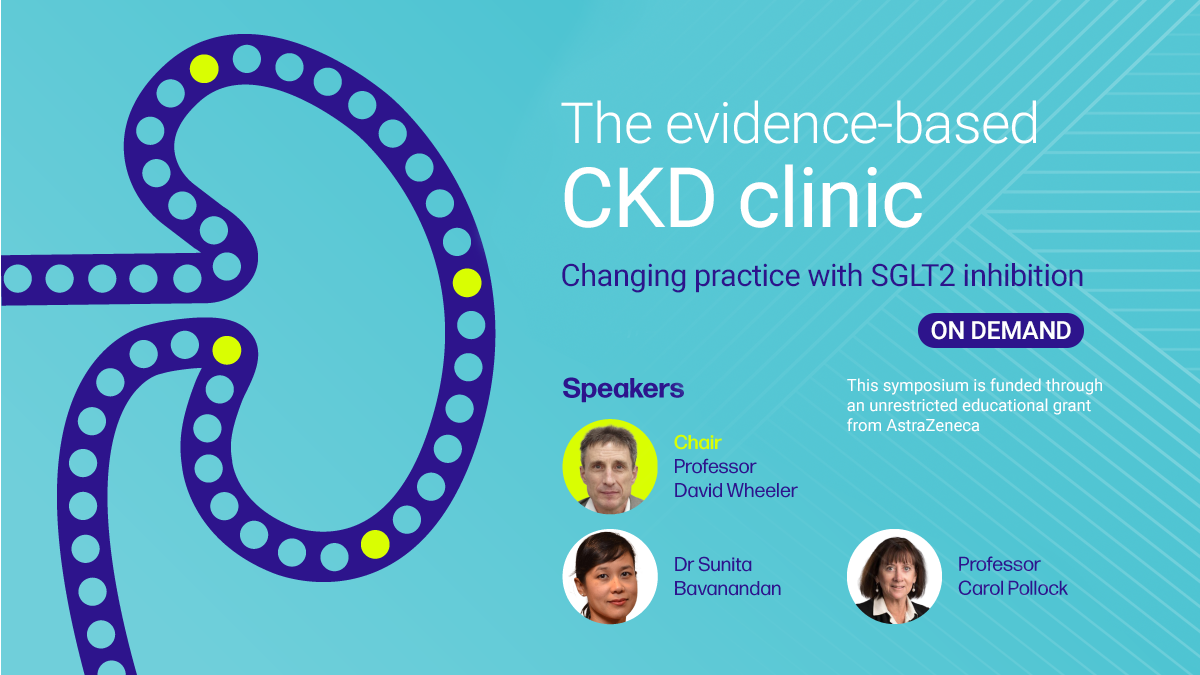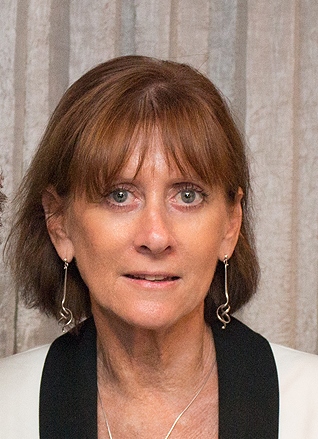The Evidence-based CKD Clinic: Changing Practice with SGLT2 Inhibition
Published: 20 January 2022
-
Views:
 65532
65532
-
Likes:
 7
7
-
Views:
 65532
65532
-
Likes:
 7
7
-
 8m 59sPart 1 The Waiting Room David Wheeler
8m 59sPart 1 The Waiting Room David Wheeler
-
 25m 4sPart 2 The Consultation Sunita Bavanandan , David Wheeler, Carol Pollock
25m 4sPart 2 The Consultation Sunita Bavanandan , David Wheeler, Carol Pollock
-
 11m 41sPart 3 The Follow-up David Wheeler, Carol Pollock, Sunita Bavanandan
11m 41sPart 3 The Follow-up David Wheeler, Carol Pollock, Sunita Bavanandan
-
 10m 46sPart 4 Patient Discharged David Wheeler
10m 46sPart 4 Patient Discharged David Wheeler
Overview
Starting at the waiting room, then through to the consultation, follow-up and patient discharge, explore the role of SGLT2 inhibition in treating CKD, based on efficacy data.
Chair, Prof David Wheeler (University College London, UK) leads the patient-based, data-supported discussion on the renal efficacy and implementation of SGLT2 inhibitors in the treatment of CKD alongside Prof Carol Pollock and Dr Sunita Bavanandan.
After this educational symposium, delegates will:
- Recognise SGLT2 inhibitors as part of the evidence-based CKD treatment landscape
- Understand data supporting the renal efficacy of SGLT2 inhibition in relation to the treatment and clinical outcomes of CKD
- Be able to identify the optimal time to initiate SGLT2 inhibitors in the treatment ofCKD
Target Audience
- Cardiologists
- Nephrologists
More from this programme
Part 1
The Waiting Room
| 1 session | |
| The Waiting Room | Watch now |
Part 2
The Consultation
| 1 session | |
| The Consultation | Watch now |
Part 3
The Follow-up
| 1 session | |
| The Follow-up | Watch now |
Part 4
Patient Discharged
| 1 session | |
| Patient Discharged | Watch now |
Part 5
Q&A and Panel Discussion
| 1 session | |
| Q&A and Panel Discussion | Watch now |
Faculty Biographies

David Wheeler
David Wheeler is Professor of Kidney Medicine at University College London and Honorary Consultant Nephrologist at the Royal Free London NHS Foundation Trust.Professor Wheeler is a clinician scientist interested in the complications of chronic kidney disease (CKD), specifically those that increase the burden of cardiovascular disease and/or accelerate progression of kidney failure. He has participated in the development and running of several large-scale clinical trials testing lipid-lowering regimens, calcimimetics, intravenous iron, sodium–glucose co-transporter 2 inhibitors and hypoxia-inducible factor stabilisers in patients with CKD.Professor Wheeler has also been involved in the development of clinical practice guidelines for several organisations, most recently for Kidney Disease: Improving Global Outcomes (KDIGO). He served as KDIGO co-Chair between 2012 and 2019. His ongoing roles include serving as the National Specialty Lead for the National Institute of Health Research…

Sunita Bavanandan
Dr.Sunita Bavanandan graduated from the University of Queensland Australia in December 1991. She obtained her qualifications as a Member of the Royal College of Physicians United Kingdom in 1997 and became a Fellow of the Royal College of Physicians Edinburgh in 2007. From 2003-2004 she obtained further training at the Leicester General Hospital, United Kingdom. Special interests are in Chronic Kidney Disease, Hypertension, Diabetic Kidney Disease, and Peritoneal Dialysis.
She has been a member of several Malaysian Guidelines Development Committees including CPG on Management of Hypertension (3rd to 5th editions), CPG on Management of Chronic Kidney Disease in Adults (1st and 2nd editions) and CPG for the Management of Heart Failure 2019.
She contributes as an editor/author for chapters in the Malaysian…

Carol Pollock
Carol Pollock is an academic nephrologist and renal transplant physician with over 290 publications in basic research and clinical medicine. She is an inaugural Fellow of the Australian Academy of Health and Medical Sciences (2015), was conferred a Vice Chancellors Award for Excellence in Research Supervision (2012) and recognised as a ‘Distinguished Professor’ by the University of Sydney (2012).





